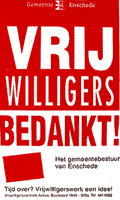Recognition is an important instrument for perceiving the achievements of individuals in the community, making them visible and motivating and inspiring others for commitment. Therefore, a culture of recognition that gives something back to everyone who contributes their energy, ideas, time and much more should be taken for granted.
Recognition can be expressed through various forms of appreciation, esteem and recognition of opportunities for participation in organisations, institutions and services, including the provision of material, human and financial resources. Within organisations, praise and recognition should be given for commitment at all levels. Every person feels confirmed and motivated by praise from the outside, whether between the executive floor and the staff or simply between several members of a team of volunteers.
The Enquete Commission of the German Bundestag “Zukunft des Bürgerschaftlichen Engagements” has dedicated a separate chapter to the culture of recognition in its report. It distinguishes between intangible and non-material, monetary and monetary forms of recognition.
Intangible recognition
 The ideal forms include awards and honours in the form of medals, plaques, pins of honour, medals, prizes and the like, but also reporting in the public media, honorary memberships, ranks (e.g. volunteer fire brigade), thanks like the simple thank you in everyday life, thank you events for the day of the honorary office, greetings and receptions with representatives of the state or of federations etc., attentions like congratulations to personal occasions, invitations to the meal, small presents etc. In Holland, for example, on International Volunteers Day, the committed are thanked from large banners. [Source, as of 12 February 2018]
The ideal forms include awards and honours in the form of medals, plaques, pins of honour, medals, prizes and the like, but also reporting in the public media, honorary memberships, ranks (e.g. volunteer fire brigade), thanks like the simple thank you in everyday life, thank you events for the day of the honorary office, greetings and receptions with representatives of the state or of federations etc., attentions like congratulations to personal occasions, invitations to the meal, small presents etc. In Holland, for example, on International Volunteers Day, the committed are thanked from large banners. [Source, as of 12 February 2018]
Monetary Values Recognition
Monetary value recognition can take the form of free or reduced use of public transport, cultural and leisure facilities, sponsorship by local and regional businesses and crafts (e.g. in the form of certain services or goods for committed persons), by taking into account civic involvement in the allocation of kindergarten, study and residential home places, consideration within the framework of the BAFÖG and Meister-BAFÖG, catering in associations and clubs, assistance in the search for an apartment/accommodation, leave of absence, (paid) special and educational leave, further and advanced training offers for the committed persons, certification in the commitment of acquired qualifications and their recognition in school, training, studies and profession.
Monetary recognition
In turn, monetary recognition can be reimbursed by direct remuneration such as small fees, pocket money, reimbursement of expenses (e.g. travel costs, postage and telephone costs), lump-sum expense allowances, tax exemption from expense allowances (e.g. trainer allowance), contribution payments to liability and accident insurance for the committed, financial support of independent projects by committed persons.
However, monetary recognition should not be mentioned without reservation: The risks and side effects of monetization are also highlighted in the public debate. It is criticised, for example, that this blurs the boundaries between voluntary involvement and gainful employment and establishes a low-paid area of gainful employment “through the back door”, with various labour and social law issues in the baggage (see http://www.ehrenamtsbibliothek.de/literatur/pdf%5F1235%2Epdf). In addition, the danger is seen that private relationships but also rights and obligations as citizens are damaged or reduced if they become goods (see http://www.ehrenamtsbibliothek.de/literatur/pdf%5F1235%2Epdf).
Further information
- http://www.tatennetz.de/files/anerkennung_voluntary_commitments_19.march2010.pdf
- http://www.ehrenamtsbibliothek.de/literatur/pdf%5F1235%2Epdf
- Enquête Commission “The Future of Civic Involvement”
Stories of success
Numerous examples, as the city of Nürtingen says thank you, can be found here.
On two pages, the Volunteer Agency Bremen has put together 101 ways to say thank you.
